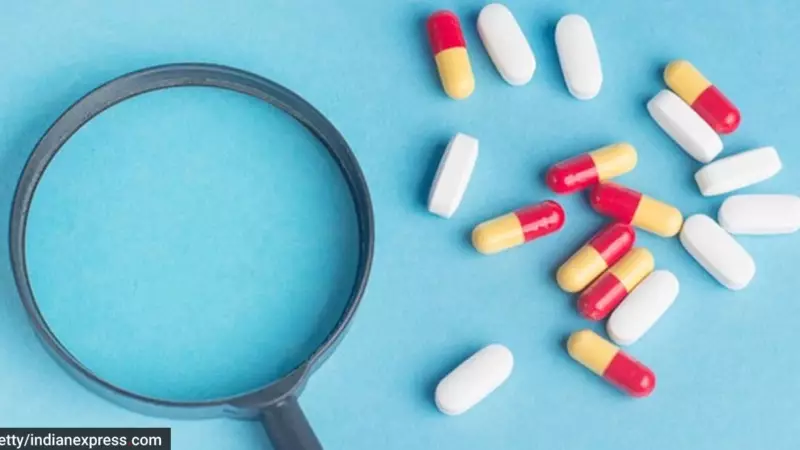
Self-Medication Nightmare: How Antibiotic Misuse Nearly Cost a Life
A young man's routine approach to treating his stomach pain nearly turned fatal when his self-medication habits led to severe intestinal bleeding and emergency surgery. The patient was admitted to Fortis Hospital in Mohali with dangerously low haemoglobin levels and a persistent fever that hadn't responded to oral antibiotics.
Soon after admission, the situation escalated dramatically when the patient experienced massive intestinal bleeding, requiring immediate surgical intervention. Medical tests revealed he was suffering from typhoid fever complicated by a large intestinal perforation - a serious condition that could have proven fatal without prompt medical care.
The Dangerous Pattern of Self-Medication
According to Dr Parvinder Chawla, Senior Consultant in Internal Medicine at Fortis Hospital, the patient had repeatedly taken ciprofloxacin whenever he suspected a stomach infection. "This antibiotic had worked for his intestinal infections earlier, so he assumed it would work for his stomach pain this time too," Dr Chawla explained.
The consequences were severe: years of unsupervised antibiotic use had not only made the patient resistant to ciprofloxacin but also damaged his gut lining. "This could have turned out to be fatal," Dr Chawla emphasized, noting that instead of taking standard paracetamol for fever - the only medicine that can be safely taken without medical consultation - the patient made the critical error of self-medicating with antibiotics.
Understanding India's Antimicrobial Resistance Crisis
Antimicrobial resistance (AMR) occurs when microorganisms like bacteria, viruses, fungi, and parasites develop the ability to withstand drugs designed to kill them. This natural evolutionary process is dramatically accelerated by misuse of antibiotics, making infections harder to treat and increasing the risk of prolonged illness and death.
Typhoid has become one of the most glaring examples of AMR in India over recent decades. Dr Chawla recalls that in the late 1990s, typhoid was easily cured by the newly introduced ciprofloxacin. The drug was oral, highly effective, and cost-efficient. However, decades of unsupervised use have rendered it largely useless against typhoid.
"Patients who are still prescribed this antibiotic in peripheral areas for suspected typhoid often end up requiring hospitalization and prolonged intravenous antibiotics," Dr Chawla noted. The problem compounds itself as the failed antibiotic not only doesn't work against the target organism but also disrupts normal gut microorganisms and induces resistance development in other intestinal bacteria.
Alarming Data on Antibiotic Resistance in India
A recent study published in The Lancet's Clinical Medicine highlights the severity of India's AMR crisis. The research found that Indian patients recorded the highest global prevalence of multidrug-resistant organisms (MDROs) among those undergoing a common endoscopic procedure.
The statistics are concerning: 83.1 percent of Indian patients carried at least one superbug, and 70.2 percent carried ESBL-producing bacteria, making many common antibiotics ineffective. Conditions associated with higher MDRO prevalence include:
- Chronic lung disease
- Congestive heart failure
- Recent penicillin use
- Frequent hospital admissions
- Prior medical procedures
Recent data from Fortis Hospital reveals the rapid escalation of ciprofloxacin resistance in typhoid cases. Resistance rates have skyrocketed from 20-40 percent in 2018 to 88 percent in the last two years. This alarming trend has forced doctors to immediately admit and start intravenous antibiotics (Ceftriaxone) for most patients with suspected typhoid.
Even more worrying, reports of resistance to Ceftriaxone have started emerging from different parts of the country. "If we do not take definitive, discrete action now to prevent, diagnose and treat typhoid fever effectively, we may soon end up making this common malady a fatal one," Dr Chawla warned.
The Long-Term Impact and Solutions
Research indicates that changes to the gut microbiome from antibiotics like ciprofloxacin can persist for a year or longer, even after discontinuing the medication. This long-term disruption highlights the importance of cautious antibiotic use.
Dr Nusrat Shafiq, Professor in the Department of Pharmacology at PGIMER Chandigarh and convener of antimicrobial stewardship activities, emphasizes the need for healthcare professionals to educate themselves on rational antibiotic use. "Healthcare professionals need to educate themselves on rational and responsible use of antibiotics through various resources available and act based on data," she stated.
Key preventive measures include:
- Practicing proper hand hygiene
- Ensuring access to clean water and food
- Maintaining good sanitation
- Staying updated with vaccinations
- Avoiding unnecessary antibiotic use
"Not all fevers or diarrhoea need antibiotic treatment," Dr Shafiq reminded, highlighting that many common illnesses resolve without antibiotic intervention. The collective effort to combat AMR requires both medical professional responsibility and public awareness about the dangers of self-medication and antibiotic misuse.





